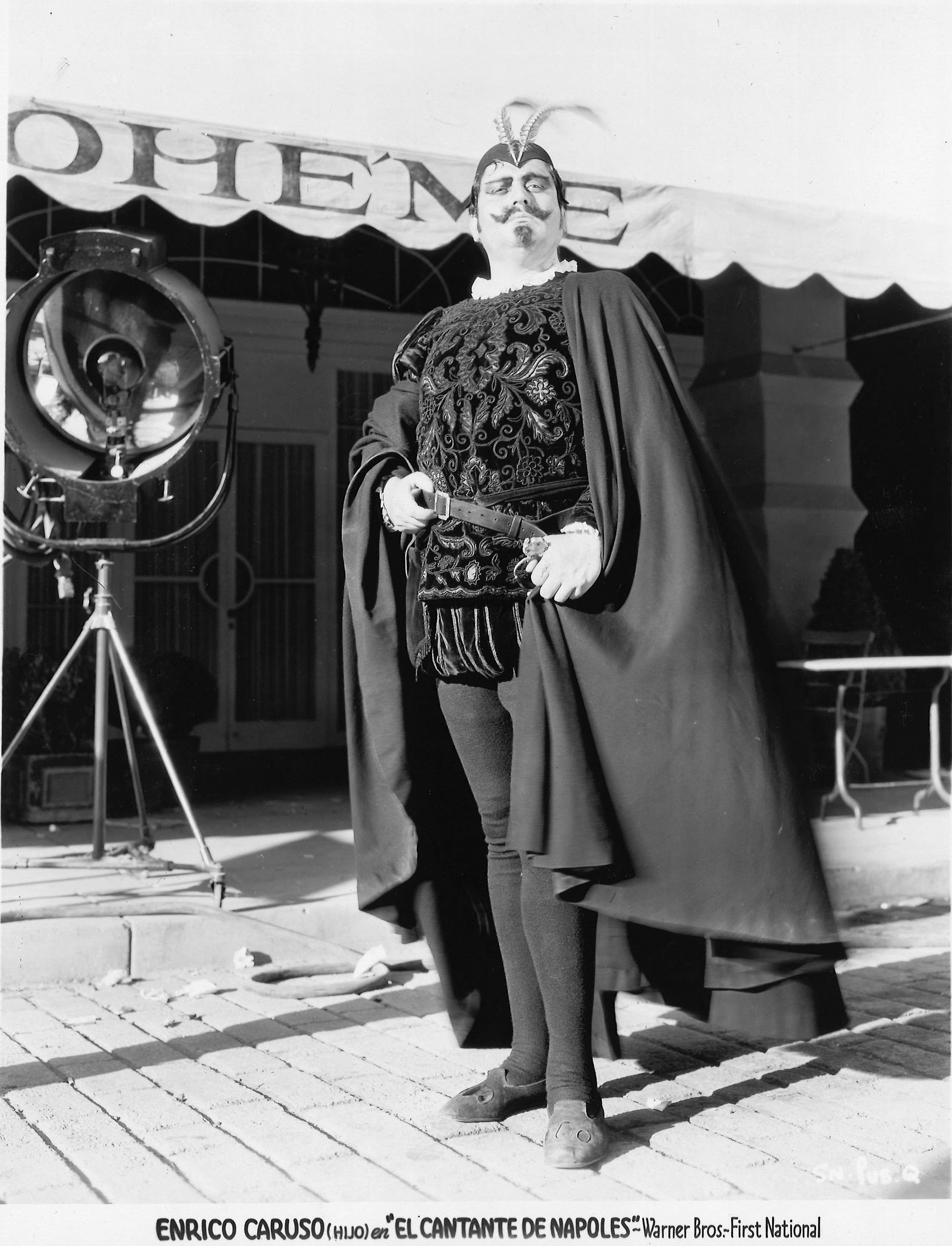 The Enrico Caruso, Jr. Collection consists of materials including photographs, scripts, correspondence, musical manuscripts, and sound recordings from Enrico Caruso, Jr. The collection was assembled by donor Andrew Farkas with materials he acquired over time, as well as materials he inherited from Caruso Jr. and his widow.
The Enrico Caruso, Jr. Collection consists of materials including photographs, scripts, correspondence, musical manuscripts, and sound recordings from Enrico Caruso, Jr. The collection was assembled by donor Andrew Farkas with materials he acquired over time, as well as materials he inherited from Caruso Jr. and his widow.
The collection is currently being processed and a finding guide will be published in the Online Archive of California. A more detailed description of the collection is below.
General Description
The items relate to Enrico Caruso, the most famous operatic tenor of the twentieth century, his common-law wife Ada Giachetti, and their second son and namesake, Enrico Caruso, Jr., himself a singer with a brief career. Caruso, Jr., starred in two Spanish-language films made by Warner Bros. Studios in California, in 1934. The success of those films enabled him to launch a concert career as a soloist that lasted until 1941. Despite many good reviews he received, the onset of World War Two and his own awareness made him realize that his diminishing audiences expected to hear a voice like his father’s. But Caruso, Jr., was not his father. In fact, nobody ever was, then or since, so sensibly enough he gave up his singing career. Yet the recordings he made show beyond any doubt that many classical vocalists had forged successful careers with far less natural abilities than his.
Provenance
In the last years of his life, Enrico Caruso, Jr. collaborated on an autobiography with Andrew Farkas, the founding Director of Libraries of the University of North Florida (Jacksonville, Florida), a position he held for the last 33 years of his 41-year career. His avocation is opera, and in that field, he published four biographies of an individual opera singer, a comprehensive 1,840 entry plus translations annotated bio-bibliographies in 29 languages of over a thousand world famous singers, and numerous book and encyclopedia chapters, articles, critiques, reviews and presentations in the field of opera. His highly acclaimed Caruso biography, co-authored with Enrico Caruso, Jr., has been internationally recognized in over fifty reviews, and is now considered the definitive biography of some twenty-five books devoted to Caruso. The Sunday edition of The New York Times carried a pre-publication chapter from the Caruso-Farkas book on 13 May 1990. During Caruso, Jr.’s lifetime Mr. Farkas purchased several items relating to Enrico Senior, and after the demise of Junior and his widow, he inherited the remaining Caruso memorabilia. He has been the exclusive owner of the material ever since, including the copyright inherent in the appropriate items.
Collection Inventory
Seven opera arias and songs on two ten inch and two twelve inch 78 rpm (revolutions per minute) studio recordings by Enrico Caruso, Jr. Their historical importance is the documentation of the voice of Enrico Caruso, Jr., and the absolute uniqueness of the artifacts themselves. The compositions were recorded in 1939 in a single “take” on lacquer discs, in the New York City studio of voice teacher Paul Norman von Ehrenfels. No other copies ever existed. With handwritten annotation.
In March 1938, Enrico Caruso, Jr. recorded three selections for RCA Victor. One of the three selections was used on both double-sided records. They are the earliest surviving samples of his tenor voice, the timbre genetically passed from father to son. The significance lies in the comparability; the ”Caruso sound” is strikingly unique and unmistakable. These records were pressed and sold in small quantities and accordingly only very few copies of the records have survived. In today's collecting world possibly a dozen copies exist in private collections. The copies here are signed by Enrico Caruso, Jr.
Four radio interviews on eight 78 rpm acetate records with Enrico Caruso, Jr., (3 interviews) and Mrs. Helen Roth Caruso (1 interview). The interviews took place:
WGAR – Cleveland, 1-24-1945: Sid Adorn’s Column “ENRICO CARUSO”
WOR – (Location?), 5-21-1945: Mott’s Program
(Radio Station? Location?), 9-13-1945: Judith Allen Interviews Mrs. Enrico Caruso
(Radio Station? Location?), June 25, 1956.
The present collection includes five copies of all the 78 rpm recordings, private and commercial recordings, reproduced on a compact disc.
The bilingual (Spanish and English) typed scripts of the two films made by Warner Bros. in 1934, starring Enrico Caruso, Jr.: El Cantante de Napoles and La Buena Ventura. These are the only surviving copies of each script. The films were successfully shown in California and mainly in Spanish-speaking communities and countries in the United States and South America.
154 stills (mint copies) photographs of the two films (59 of the former, 54 of the latter, and 41 intermixed in a single album). No copy outside of this collection is known to exist.
Manuscript score of “Tarantella” by composer Alberto Conti, an original composition of the theme song for the film El Cantante de Napoles. First performed “live” at the Enrico Caruso Museum in Signa, Italy, by vocalist Mark Milhofer and accompanist Leonardo Ciampa on the 151st anniversary of Enrico Caruso’s birth, 2 August 2024.
Twenty-nine manuscript letters written by Enrico Caruso’s alienated common-law wife, Ada Giachetti, from Brazil to their second-born son, Enrico Caruso, Jr., between 1938 and her death in 1946. Each Italian-language letter has an accompanying English translation, handwritten by her son Enrico Caruso, Jr., plus a thirtieth translation without the original letter. No other manuscript letters exist from mother to son.
Photocopy of Last Will and Testament of Ada Giachetti, presumably handwritten by someone else, signed by Giachetti.
For more information on the collection or assistance in using the materials, please contact Special Collections staff at special@library.ucsb.edu.


